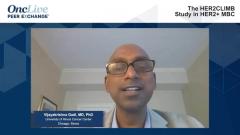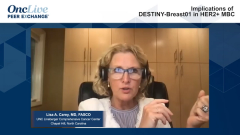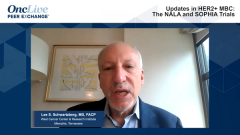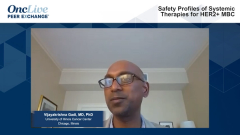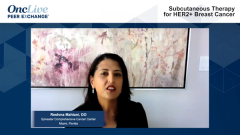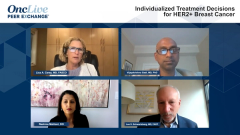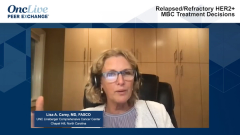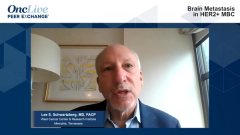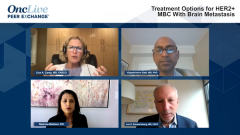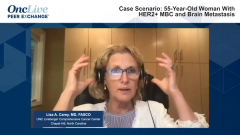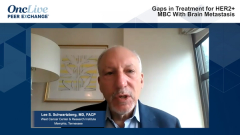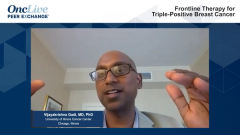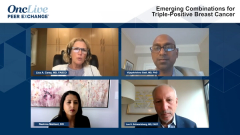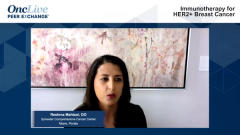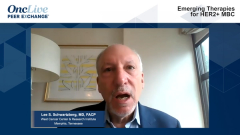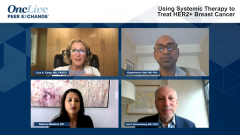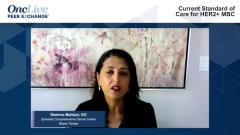
Updates in HER2+ MBC: The NALA and SOPHIA Trials
Dr Lee Schwartzberg, MD, FASCO, highlights the appropriateness for treating HER2-positive metastatic breast cancer with either neratinib plus capecitabine or margetuximab plus chemotherapy based on evidence revealed by the NALA and SOPHIA clinical trials.
Episodes in this series

Lisa A. Carey, MD, FASCO: Lee, talk a bit about NALA and SOPHIA. Where do you think these play a role in our current portfolio: the menu options for treatment?
Lee S. Schwartzberg, MD, FACP: NALA is a study that looked at neratinib [Nerlynx], another TKI [tyrosine kinase inhibitor]. This is different from tucatinib [Tukysa] in the sense that it’s a pan-HER TKI, it’s slightly older, and it was released earlier. The NALA trial looked at neratinib and capecitabine [Xeloda] vs our previous TKI standard: lapatinib [Tykerb] and capecitabine. I remember, Lisa, how much excitement there was about having a TKI after trastuzumab. We don’t use lapatinib, and it has been pushed to the back because it was the first generation. We have better TKIs now. With neratinib, that was a head-to-head comparison. It was presented and reported a couple of years ago and met its primary end point, which was an improvement in progression-free survival. It was about a 2.2-month improvement.
Lisa A. Carey, MD, FASCO: Although NALA didn’t screen all patients for CNS [central nervous system] metastases, it looked for a time to intervention for CNS metastases. There was an improvement in the time of intervention for CNS metastases, hinting activity for neratinib in the CNS as well. Based on this study, neratinib-capecitabine was an approved regimen in the metastatic setting. Where do you place it?
Lee S. Schwartzberg, MD, FACP: One of the interesting things about HER2CLIMB vs neratinib is that we have a double-HER2 therapy in HER2CLIMB and are looking at both trastuzumab and tucatinib—and here we’re looking at both with capecitabine. It’s a little hard to distinguish between the regimens, but based on what we have, neratinib and capecitabine, to me, would come later and after. As Reshma mentioned, there are 2 new, active regimens that we see in HER2CLIMB and with trastuzumab deruxtecan. In my mind, the neratinib-capecitabine would come afterward. It might be considered for fourth-line therapy, particularly in a patient who had previous exposure to a TKI and showed benefit. We’re moving very quickly. But it’s an option for late-line patients, and we’d all agree that many of our HER2 patients can often get 4, 5, 6, or more lines of therapy if they’ve done well previously.
Lisa A. Carey, MD, FASCO: How about margetuximab [Margenza]?
Lee S. Schwartzberg, MD, FACP: Margetuximab, in contrast, is the new kid on the block. Neratinib has been out for a bit, and margetuximab was studied in the SOPHIA trial, which was margetuximab plus chemotherapy vs trastuzumab and chemotherapy in heavily pretreated patients. What’s interesting about margetuximab is that it may be the first of other drugs in this class that we’re not looking at combining a chemotherapy through an ADC gene, like T-DXd [trastuzumab deruxtecan], but there’s engineering of the intrinsic antibody molecule. Margetuximab differs from trastuzumab because the Fc [fragment crystallizable] region of the antibody was engineered to increase allele activity, which the margetuximab binds to, and there were good preclinical data. In this study, which looked at both all comers and bispecific alleles, there was a benefit with margetuximab. There was, as we’ve seen updated data on this trial—which was initially released a couple of years ago—a progression-free survival benefit. The FDA recently approved margetuximab for use, with chemotherapy, in late-line patients.
Lisa A. Carey, MD, FASCO: Interestingly, they did not have a genotypic restriction on it, which I found a little surprising. How about you?
Lee S. Schwartzberg, MD, FACP: Yeah, I was surprised too. Most of the patients had the phenotype that should make a difference.
Lisa A. Carey, MD, FASCO: The low-affinity phenotype.
Lee S. Schwartzberg, MD, FACP: Yeah, the low-affinity phenotype.
Lisa A. Carey, MD, FASCO: Where do you put it?
Lee S. Schwartzberg, MD, FACP: It’s going to be a fourth- or fifth-line choice. If we look at this landscape, we have our first line for prior untreated patients, as we’ve talked about, or those that haven’t been heavily pretreated—in the adjuvant setting or neoadjuvant setting—and relapse early. We have patients who are going to get CLEOPATRA, T-DM1 [trastuzumab emtansine], tucatinib and T-DXd [trastuzumab deruxtecan], and then the 2 new regimens we can expose patients to. SOPHIA didn’t look at patients who got either of the novel therapies that we talked about—tucatinib-based regimen or T-DXd [trastuzumab deruxtecan]—which are now approved. We don’t have the data there, but we can extrapolate and say that because they’re novel agents, we can probably use them.
Lisa A. Carey, MD, FASCO: Interesting. I have to say that the natural direction for margetuximab, which needs more data, would be as a replacement for the low-affinity phenotype for Herceptin or trastuzumab in the conventional arenas. But it’s not there yet. There is a TBCRC [Translational Breast Cancer Research] trial directly comparing chemotherapy plus trastuzumab vs chemotherapy plus margetuximab, with a PCR [polymerase chain reaction] end point looking at the additional data, but only in low-affinity allele types.
Lee S. Schwartzberg, MD, FACP: That will be very definitive.
Reshma Mahtani, DO: The different magnitude of benefit among the different alleles is interesting. I was surprised how much smaller the magnitude of benefit was in the overall group and that it wasn’t approved based on any genotyping.
Lisa A. Carey, MD, FASCO: There was a suggestion that trastuzumab was better in the high-affinity alleles.
Reshma Mahtani, DO: Yeah, the highest alleles.
Transcript Edited for Clarity


